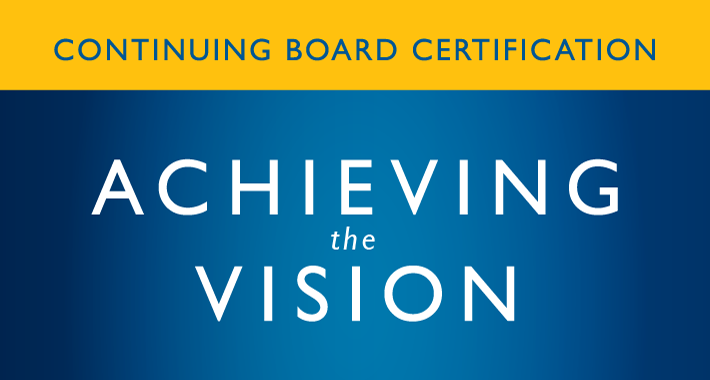
Newly Approved Standards for Continuing Certification Serve as a Framework for Member Boards’ Programs, Represent Foundational Changes that Bring Increased Value to both Diplomates and the Public
The American Board of Medical Specialties (ABMS) Board of Directors (BOD) has approved new Standards for Continuing Certification (Standards) at its October meeting. The new Standards represent the culmination of three years of consultation with physicians, professional and state medical societies, consumers, and other public stakeholders from across the health care spectrum to reconceive the way specialty physician recertification is conducted. They were developed following recommendations from the Continuing Board Certification: Vision for the Future Commission (Commission) which met throughout 2018 to provide strategic guidance to the ABMS BOD and Member Boards. The new Standards have been designed to guide the ABMS Member Boards in establishing continuing certification programs that help diplomates stay current in their specialty while providing hospitals, health systems, patients, and communities with a credential upon which they can continue to rely and depend.
The Standards recognize the value that continuing certification brings to diplomates and the public and allow ABMS to deliver on its mission in two foundational ways. First, they support both the learning and improvement needs and desires of diplomates while providing the public with a reliable, and dependable credential. Secondly, the Standards acknowledge that professional self-regulation is a collaborative process that requires the involvement of partners including professional societies, Associate Members and hospitals and health systems who all have an important role in supporting their members’ engagement in meaningful learning and improvement work.
The Standards reinforce the transition to innovative assessment programs that support and direct learning. These new assessment models represent an intentional shift from conventional high stakes exams every 10 years to frequent, flexible, online testing that offers immediate feedback and directs participants to resources for further study. The new systems support learning and retention and complement the continuing education that all physicians undertake to improve their skills. The new Standards also support greater opportunities for recognition of quality and safety improvement activities in which diplomates are engaged.
The Standards employed a development process that was both inclusive and transparent. Nearly 100 volunteers were involved, representing important stakeholder groups, including professional and state medical societies, individual practicing diplomates, Member Boards, and public constituents including credentialers and health care advocates. Additionally, thousands of individuals and organizations provided feedback on the draft Standards during an 80-day public comment period earlier this year. The feedback collected was highly valued and each draft Standard was revised in some manner to address the comments received.
In addition, the Standards achieve the essential goals established by the Continuing Board Certification: Vision for the Future Commission in its final recommendations. Most notably they reinforce the role of continuing certification as a collaborative effort between ABMS diplomates and their specialty certification boards and support diplomates in lifelong professional development to keep them current in their specialties in service of patient care. They also address the need to increase health equity and reduce health care disparities, offer a broader, more collaborative approach to continuing professional education, and shortened certification cycle times to better meet patient and public expectations.
The Standards also provide the Member Boards the flexibility to address specialty-specific requirements, and many boards have already incorporated programmatic changes that are aligned with the new Standards. A phased-in transition will be used to implement the Standards and Member Boards will continue to assess, update, and modify their programs based on diplomate and public feedback.
ABMS and its Member Boards have expressed their gratitude and appreciation to all the various stakeholders and members of the health care community and public who dedicated time or provided input to help create these Standards which will serve and lead the next generation of continuing board certification.
-
Read More:
- Achieving the Vision |
- Professionalism |
